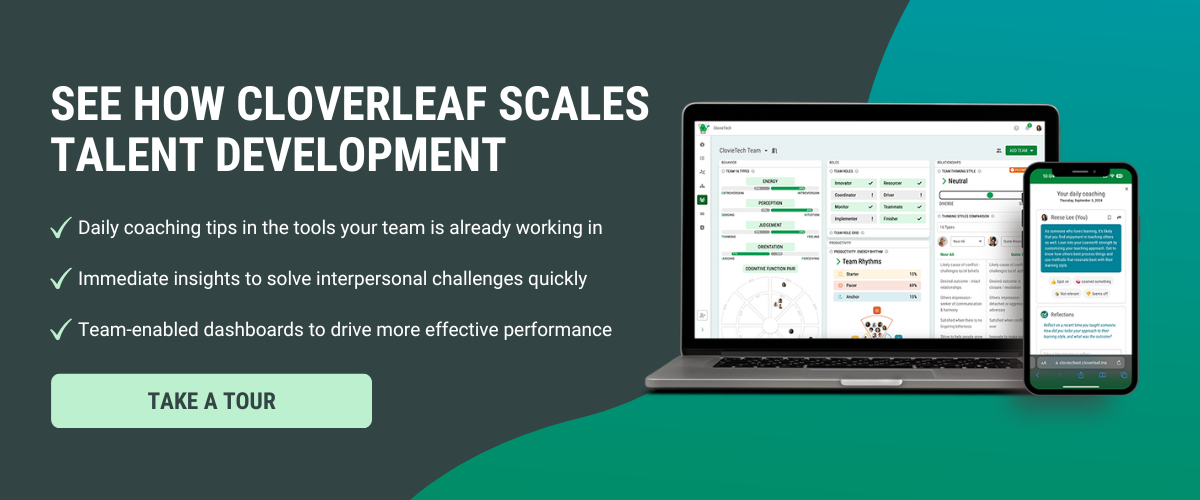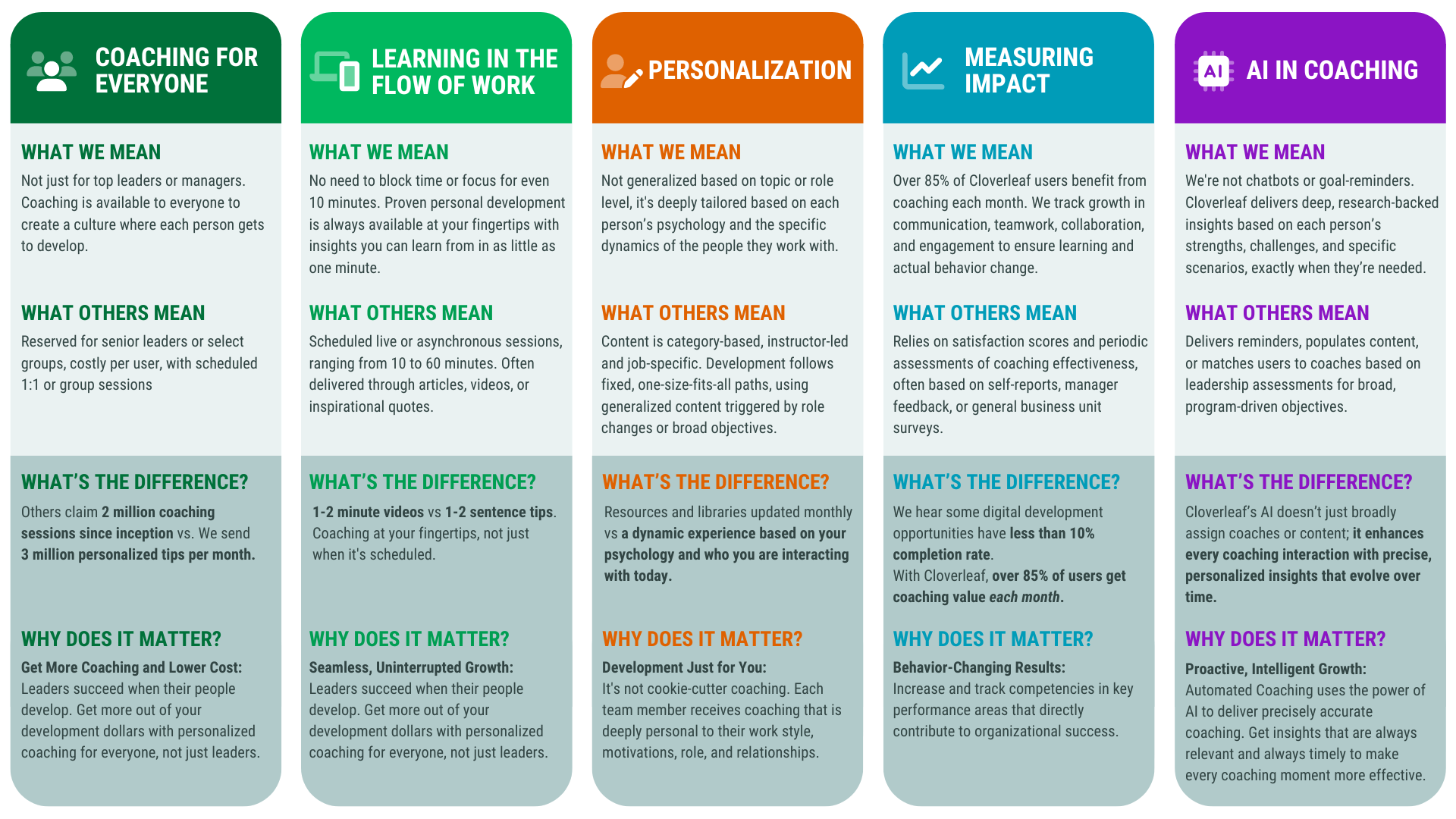Are you responsible for developing leadership and talent across an organization of hundreds—or even thousands—of employees?
You know how important coaching is for improving performance, fostering growth, and retaining top talent. But here’s the problem: how do you make that coaching truly personalized for each individual without adding a massive burden to your already full plate?
Scaling personalized coaching is one of the biggest challenges leaders face today. While there are countless development platforms out there promising personalization, most fall short when it comes to delivering insights that feel relevant and timely to each individual.
Leaders often end up with generic advice that’s loosely tied to broad milestones or role changes, leaving employees feeling disconnected from the coaching process. In modern organizations where efficiency and effectiveness matter more than ever, personalization at scale isn’t just a “nice-to-have”—it’s a necessity.
Why Personalization Matters To Your Leaders
A one-size-fits-all approach to talent development will struggle to resonate with participants. People want—and need—coaching that reflects their unique challenges, strengths, and daily work contexts.
Generic coaching content not only feels impersonal, but it can also lead to missed opportunities for growth, poor engagement, and even higher turnover.
Personalized coaching, on the other hand, ensures that each employee receives guidance tailored to their specific needs, making it far more impactful.
Most organizations struggle to provide individualized support at scale. Traditional coaching programs require time, money, and manual effort—resources that are in short supply. That’s why the ability to automate personalized coaching has become so crucial.
Automating real-time, context-specific insights allows organizations to deliver tailored support to every employee without burdening their leaders. This kind of personalization is meaningful and can transform your talent development strategy, making it scalable, relevant, and deeply impactful.
The Evolution of Personalized Coaching
Coaching has undergone a significant transformation over the past few decades. Historically, coaching was reserved for senior executives and was often and only delivered through face-to-face programs that focused on broad leadership skills or milestones like promotions. As companies recognized the value of coaching for leadership development, the approach started to shift towards more tailored methods.
One of the key moments in this evolution was adopting a coaching leadership style in the late 1990s, which emphasized individual challenges and goals rather than a programmatic model. This shift was driven by an understanding that people respond better to personalized feedback. Fast-forward to today, coaching has become increasingly data-driven, thanks to the rise of digital coaching tools that allow organizations to collect and analyze behavioral data in real time.
Solutions like automated coaching represent the next phase in this evolution. Platforms like Cloverleaf use technology to provide personalized feedback available at any moment that is specific to the person and their team. This approach moves away from previous methods of sharing coaching or advice during scheduled times or only if people hit job role changes.
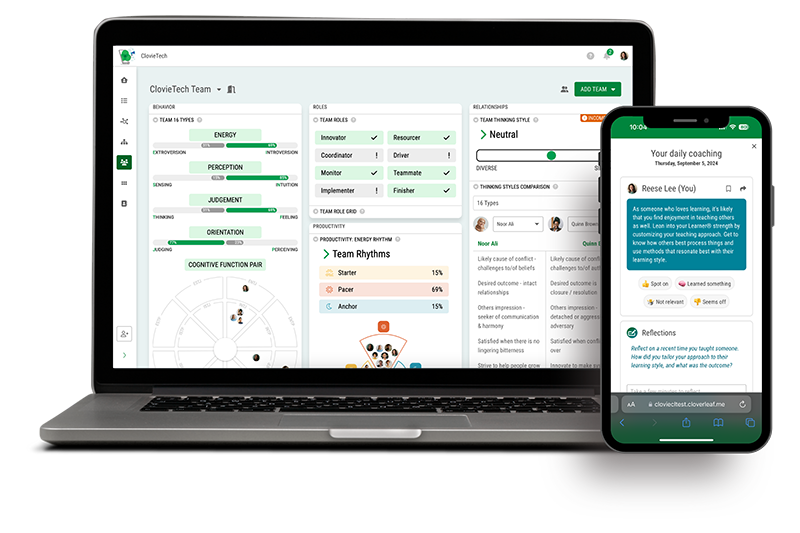
See How Cloverleaf Scales Talent Development
- Daily coaching tips in the tools your team is already working in
- Immediate insights to solve interpersonal challenges quickly
- Team-enabled dashboards to drive more effective performance
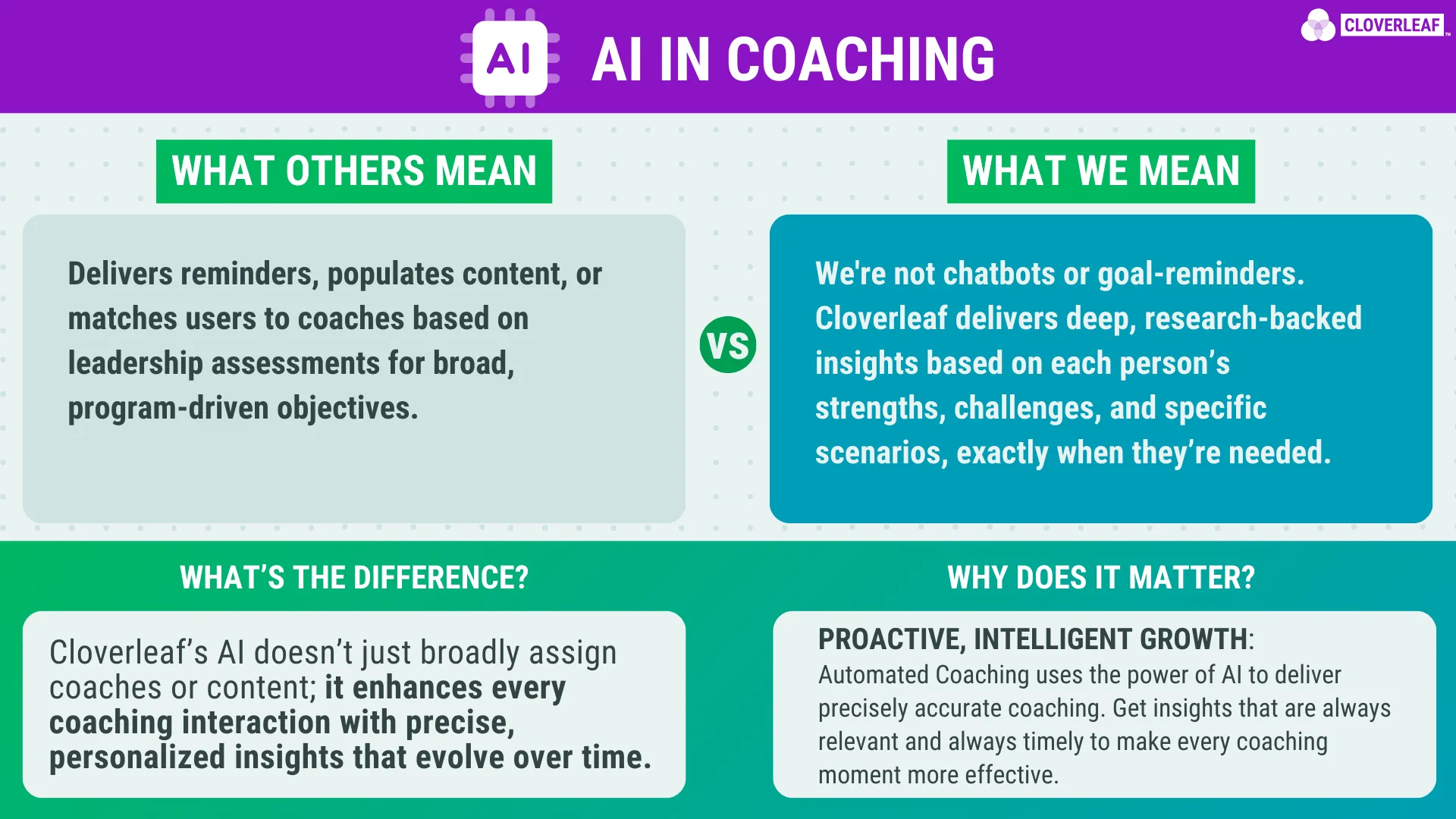
4 Trends That Are Shaping The Future Of Personalized Coaching
1. AI-Powered Coaching:
Generative AI and other technologies are being used to support and enhance coaching efforts. Rather than replacing human coaches, AI acts as a “co-pilot,” offering personalized nudges and prompts to reinforce valuable learning that happens in development programs or during coaching sessions. This extends the coaching process beyond scheduled meetings, ensuring that individuals receive continuous, tailored support.
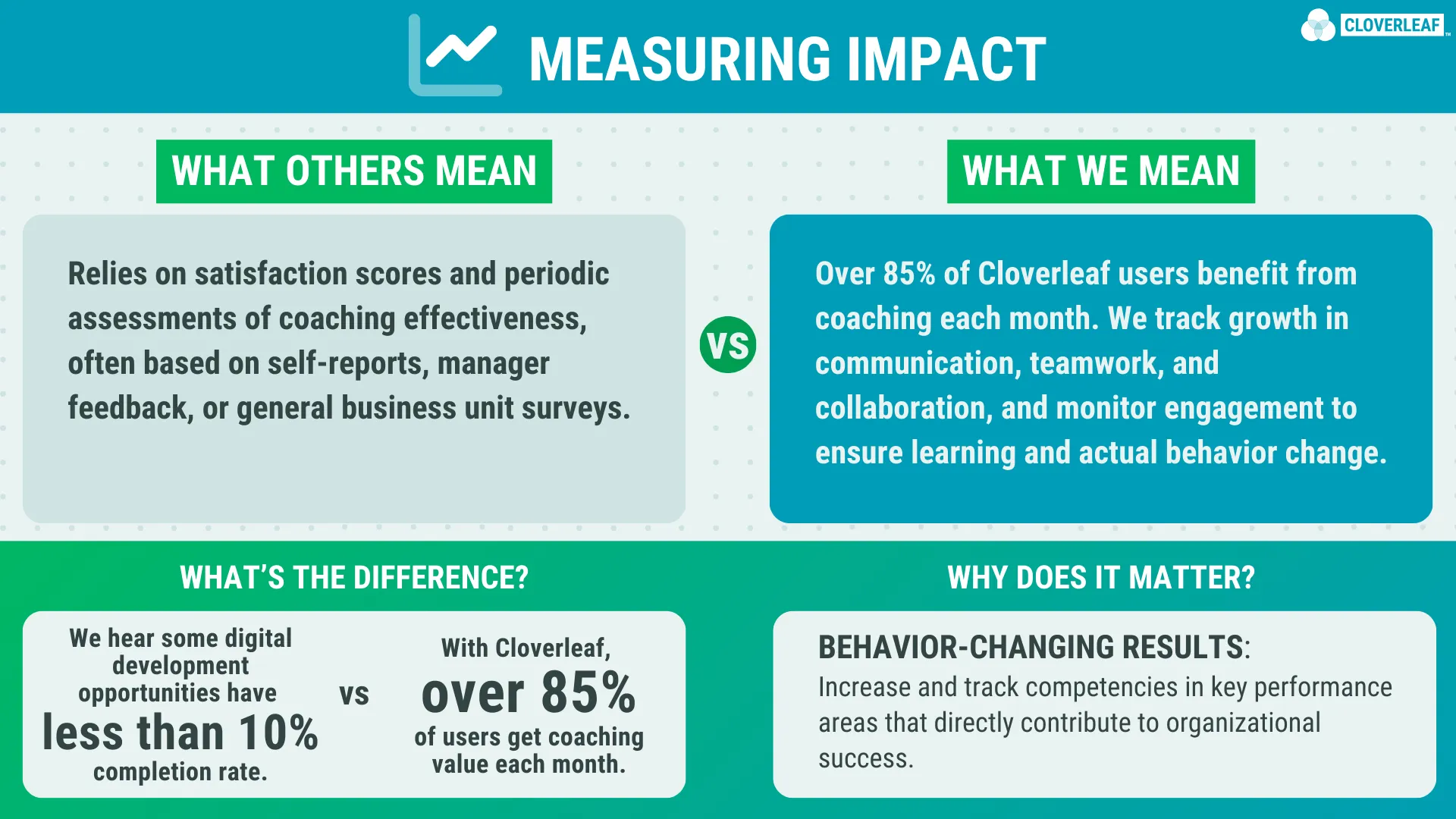
2. Data and Performance Metrics:
Leaders want to know the real impact of coaching. It’s not just about new learning or positive feedback—what matters is whether coaching is actually moving the needle on team performance. Is there a measurable change in behavior and skill application? What’s the return on investment (ROI)? Beyond sentiment and new knowledge, organizations need to see if people’s behaviors are changing in ways that improve the business.
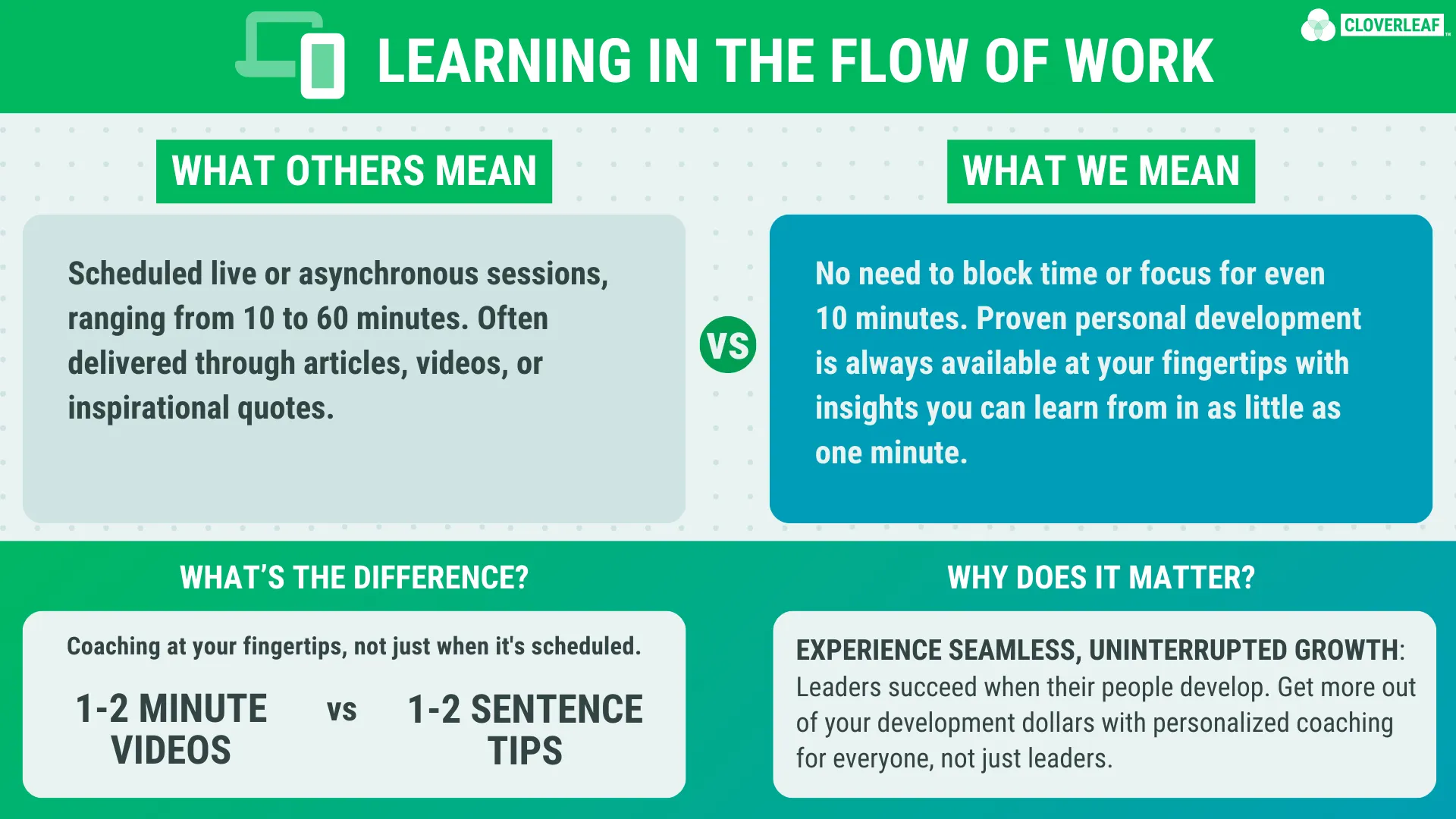
3. Contextualization:
Unlike traditional coaching, available at predetermined times, contextual coaching delivers situation-specific guidance based on an employee’s current work challenges and interactions.
This approach ensures that coaching is actionable and relevant to what’s happening right now, allowing employees to apply the advice immediately, whether it’s before an important meeting or during a critical project, or whenever is best for the individual.
Contextual coaching integrates learning and development into the flow of work, making it both timely and impactful.
This trend is becoming essential as organizations strive to provide more targeted support without adding unnecessary friction to employees’ day-to-day tasks.
4. Remote and Hybrid Coaching:
The shift toward remote and hybrid work environments has pushed coaching to evolve. Virtual coaching, already gaining traction before the pandemic, has now become standard. This trend is further escalated by tools that provide micro coaching moments to ensure each team member receives timely, tailored coaching tips based on their current work challenges and team dynamics throughout their day.
The Demands For Personalization Are Pressing
Despite the advancements in coaching, many platforms struggle to deliver truly personalized coaching at scale. A common issue is that much of the “personalization” offered by many platforms is topical—often limited to role-based advice or broad, milestone-driven coaching. These solutions tend to trigger generic content based on fixed objectives, leading to disengaged participants who don’t feel that the coaching is truly relevant to their immediate needs.
In contrast, automated coaching solves these issues by offering timely, specific advice that is relevant to the individual’s behaviors, strengths, and current work situation. Rather than giving broad, general feedback, it provides coaching that’s action-oriented and contextual because it is about what is happening in the moment. This way, organizations can offer personalized coaching to everyone without overloading their leaders.
By understanding this evolution and leveraging technology, Talent Development Leaders can address the challenges of scaling personalized coaching to drive behavior change and improve performance across their organizations—without overwhelming themselves in the process.
See How Cloverleaf Scales Personalized Coaching
Take a look at Cloverleaf’s key features that can empower your people, build trust, and scale development effortlessly.
The 3 Necessary Components of Effective Personalized Coaching
For personalized coaching to be meaningful and drive behavior change, there are three essential elements to consider: aligning with individual needs, helping employees manage emotions and relationships, and providing support during key moments of work.
Each of these components ensures that coaching becomes practical and relevant, offering insights that people can apply right away to their unique challenges.
1. Resonance with Individual Needs:
For personalized coaching to be effective, it must genuinely connect with each person’s unique challenges and goals. Automated coaching platforms can layer behavioral assessment data like DISC, Enneagram, or 16 Types to better understand how people think, communicate, and approach tasks. This isn’t just about labeling personality traits—it’s about using those insights to provide advice that fits how an individual works in specific situations.
For example, someone who tends to be more detail-oriented may struggle in fast-paced environments. Automated coaching can recognize this tendency and send reminders or strategies to help them manage their workload more effectively in those moments. Likewise, for someone who thrives on collaboration but finds themselves in a remote working situation, the platform can suggest ways to stay connected and communicate more effectively with their team.
This process is powerful because the advice doesn’t come as a generic suggestion, like “work better with your team,” but as specific, situational guidance that feels relevant to what they’re dealing with right now. This could be a tip about managing time before a deadline or a suggestion on how to better frame an idea in a meeting with a team member who thinks differently. In short, it’s advice that feels useful immediately, helping employees put it into practice in the moment.
By providing this type of direct, situation-specific guidance, automated coaching tools make it easier for team members to take what they learn and use it right away, ensuring that the coaching feels both timely and effective.
2. Assist With Managing Emotions and Relationships in Real Time
Another aspect of effective personalized coaching is understanding how emotions and relationships influence workplace success. Emotional Intelligence (EQ) is about recognizing and managing your own emotions, as well as understanding how others feel and react in different situations. Automated AI coaching technology can consider this by analyzing an employee’s emotional tendencies, such as how they handle stress, communicate under pressure, or lead a team.
Rather than simply giving generic advice, these platforms offer specific, emotionally-informed tips that help employees manage difficult conversations, reduce stress, or adapt their leadership style based on their emotional strengths and challenges.
What makes this approach powerful is that it delivers insights exactly when they’re needed. So, instead of waiting for a coaching session to discuss these challenges, employees receive timely suggestions—for example, a quick reminder to take a breath and stay calm before a high-stakes conversation. Emotional intelligence coaching helps employees stay grounded in the moment and improve how they respond to stressful situations, leading to better team interactions and overall performance.
In high-pressure scenarios, like giving feedback to a team member or handling a tough client call, this coaching helps employees navigate their emotions effectively. By receiving a helpful nudge—like a suggestion to approach the conversation with empathy or patience—they can adjust their behavior accordingly, ensuring their emotional response aligns with their goals for the interaction.
3. Getting Guidance When You Need It
One of the most valuable aspects of modern coaching technology is its ability to deliver advice that fits a person’s exact situation. In the past, coaching often relied on set times, like scheduled sessions, quarterly reviews, or weekly meetings. But these broadly dispersed times don’t always match up with the challenges employees encounter day to day.
Automated coaching can provide specific advice exactly when it’s needed so that the guidance is contextual. Employees no longer have to wait for formal meetings to get helpful input. Instead, they can receive coaching during the moments that matter—while they’re working on a project or navigating a tricky conversation with a teammate.
For instance, imagine an employee working on a tight deadline with a teammate with a different communication style. Individuals can populate personalized coaching tips in real time on how to better approach that teammate to collaborate more effectively right then and there. This approach means coaching becomes part of the daily workflow, making it easier for employees to apply what they learn.
Effective personalized coaching relies on the ability to provide employees with advice and guidance that fits their unique needs, challenges, and emotional awareness, nudged to them or available on demand.
Platforms that can bridge the gap between traditional, scheduled coaching sessions and the immediate demands of the workplace are necessary.
By using data from behavioral assessments, these platforms can offer tailored insights that help individuals and teams adapt their communication, leadership styles, and emotional responses, with access help when it is needed or preferred.
Practical Steps for Automating Personalized Coaching
Before introducing any coaching platform, it’s essential to identify where personalized coaching will have the greatest impact. This process requires assessing the specific needs of your organization to ensure coaching is targeted to areas that need it the most. Key areas to consider include:
- High-turnover teams: Coaching can be pivotal for teams struggling with retention. It helps create a stronger connection between individuals and the organization, improving engagement.
- First-time managers: New leaders often need extra support in building leadership skills and navigating team dynamics. Automated coaching can provide timely, actionable feedback to help them grow more quickly.
- Internal conflict and low morale: If your organization is experiencing internal conflict or a poor culture, coaching can help team members improve communication, collaboration, and overall team dynamics.
- New or cross-functional teams: Teams that are newly formed or undergoing changes in structure often benefit from automating personalized coaching to help individuals understand each other’s work styles and enable better communication.
Assessing these needs helps ensure that coaching is introduced in areas that make the most immediate and visible difference.
Selecting a Coaching Platform
Not all coaching platforms do the same things; selecting the right one is critical for success.
When evaluating potential tools, you should consider:
- Integration into daily workflows: Look for platforms that integrate with tools your teams already use to ensure coaching is seamlessly delivered in the flow of work.
- Behavioral insights: Ensure the platform provides data-driven coaching that can adapt to the individual needs of your employees.
- Scalability: Consider whether the platform can handle the size of your organization and provide consistent, personalized coaching at scale without burdening leaders.
- Contextual: Choose a platform that delivers timely, actionable support so employees receive the coaching when it’s most relevant to their work challenges.
For more information on choosing the right platform, you can refer to Which People Development Software Is Best for Your Team, which offers a deeper dive into various options.
Rethinking The Possibilities Of Personalized Coaching For Your Team
As the workplace evolves with more remote and hybrid environments, automated coaching provides a solution that meets modern demands, offering scalable, emotionally informed, and context-specific feedback that makes a real impact. For Talent Development Leaders, the path to successful coaching at scale is clear: leverage technology to provide meaningful, personalized support to every employee, no matter where they are.
Automating personalized coaching is not just a way to streamline leadership development—it’s a critical approach to scaling meaningful, real-time feedback that aligns with each employee’s unique needs and work context.
By embracing technology that offers tailored insights, organizations can overcome the common pitfalls of traditional coaching models, such as generic advice and disengagement.
Platforms like Cloverleaf enable leaders to deliver personalized, actionable coaching without adding to their workload, making it possible to improve both individual and team performance.


